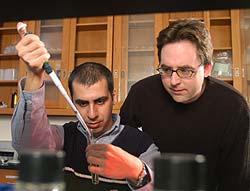
Technique could lead to new drug delivery systems, biological warfare sensors
Using a lab technique called domain insertion, Johns Hopkins researchers have joined two proteins in a way that creates a molecular “switch.” The result, the researchers say, is a microscopic protein partnership in which one member controls the activity of the other. Similarly coupled proteins may someday be used to produce specialized molecules that deliver lethal drugs only to cancerous cells. They also m

Mobile DNA’s role in vancomycin resistance of Enterococcus faecalis
‘Jumping’ elements of DNA have enabled the bacterium Enterococcus faecalis to acquire stubborn resistance to a range of antibiotics – including a “drug of last resort” that is used against such bacterial pathogens.
That is one of the conclusions reached by scientists at The Institute for Genomic Research (TIGR), which sequenced and analyzed the complete genome of E. faecalis V583, a strain of the

Researchers at the University of California, San Diego have discovered how to transfer the optical properties of silicon crystal sensors to plastic, an achievement that could lead to the development of flexible, implantable devices capable of monitoring the delivery of drugs within the body, the strains on a weak joint or even the healing of a suture.
The discovery is detailed in the March 28 issue of Science by a UCSD team that pioneered the development of a number of novel optical sensor

Timing of childbirth cited as key factor
Europe’s population has aged to such a degree that it will likely continue to shrink, even if birthrates rebound to a one-for-one replacement level, a new study suggests. A major part of this trend is due to the fact that women have been postponing childbirth for increasing lengths of time, the authors have found. Their research appears in the journal Science, published by the American Association for the Advancement of Science (AAAS).

The manufacture of electronic devices such as the new generation of video mobile phones could be revolutionised thanks to assembly research being pioneered at the University of Greenwich.
This research will provide industry with the microsystems assembly technology to allow cheaper mass production of the next generation of intelligent products, such as mobiles, visual display equipment and medical devices. It could, for example, be used to develop minute ’invisible’ hearing aids.

A pulsed electric arc could provide an alternative to chlorination and other chemical methods of disinfecting water, according to researchers from the University of Poitiers, France, speaking to the Institute of Physics’ Congress on March 27 at Heriot-Watt University.
Water treatment is usually carried out using chlorine-containing disinfecting agents but these produce by-products that are coming under increasing scrutiny by the European Community. Chemical agents to destroy pollutants

– new calculation confirms standard model of particle physics. Contribution of hadronic vacuum polarization determined with unprecedented accuracy. The magnetic moment of the muon is an important precision parameter for…
Technique may prevent formation of unwanted waves that siphon off needed energy. Heating plasma to the ultra-high temperatures needed for fusion reactions requires more than turning the dial on a…

An international team of astronomers, led by researchers from the Astronomical Observatory of the University of Warsaw, have identified a new class of cosmic X-ray sources. The findings have been…

How deubiquitinases USP53 and USP54 cleave long polyubiquitin chains and how the former is linked to liver disease in children. Deubiquitinases (DUBs) are enzymes used by cells to trim protein…

Conceptual blueprint to analyze experimental catalyst data. Machine learning (ML) models have recently become popular in the field of heterogeneous catalyst design. The inherent complexity of the interactions between catalyst…

Antibody that Neutralizes Inhibitory Factors Involved in Nerve Regeneration Leads to Enhanced Motor Function after Acute Spinal Cord Injury. Researchers at 13 clinics in Germany, Switzerland, the Czech Republic and…

How simulations help manufacturing of modern displays. Modern materials must be recyclable and sustainable. Consumer electronics is no exception, with organic light-emitting diodes (OLEDs) taking over modern televisions and portable…

“Neurons that fire together, wire together” describes the neural plasticity seen in human brains, but neurons grown in a dish don’t seem to follow these rules. Neurons that are cultured…

The quest for sustainable energy solutions has been a major focus of scientific research for decades. Solar energy, a clean and renewable source, has emerged as a promising alternative to…

With a processing speed a billion times faster than nature, chip-based laser neuron could help advance AI tasks such as pattern recognition and sequence prediction. Researchers have developed a laser-based…

New technology could remotely identify various types of plastics, offering a valuable tool for future monitoring and analysis of oceanic plastic pollution. Researchers have developed a new hyperspectral Raman imaging…

Artificial Intelligence (AI) has established a strong presence across industries, large and small. The “VoBaKI” research project has empowered small and medium-sized enterprises (SMEs) with an innovative tool to independently…